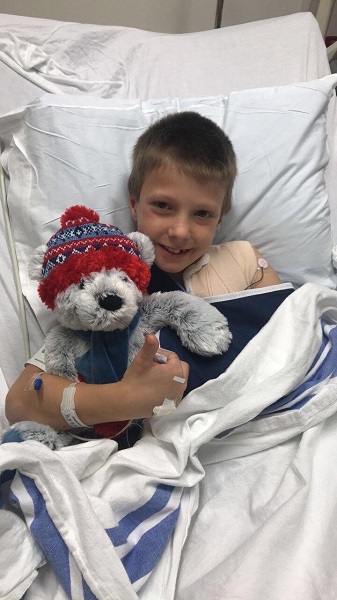Quick Diagnosis Proves Life-Saving for Moultrie Youngster

Rylan Smith of Moultrie is back to doing most of the things he enjoyed doing before being taken to Wolfson Children’s Hospital in Jacksonville, Florida. He was diagnosed and treated for Long Q-T syndrome, a rare heart disorder.
Last September, the Smith family of Moultrie was enjoying a Sunday outing at Wild Adventures Theme Park in Valdosta. Their family fun quickly ended when son, Rylan, 9, had a seizure and collapsed while at the bungee jumping attraction.
“We were so worried about him,” Rylan’s mom, Chantel Smith, said. “Rylan is an active kid and constantly on the go, playing baseball, football and hip-hop dancing. Normally, you can’t stop him.”
Rylan was taken to the ER at a local hospital, where doctors examined him. They monitored his vital signs and gave him fluids for dehydration before he was discharged home.
Four days later, a second incident occurred. Rylan, a third-grader at Odom Elementary School in Moultrie, collapsed again while at school. He was taken to the ER at a different local hospital. Doctors ordered a CT scan and MRI, and the results were abnormal. Doctors recommended that Rylan be transferred to a children’s hospital for specialty care.
“As a nurse, I was familiar with Wolfson Children’s Hospital, and I immediately knew that’s where I wanted Rylan to go for care,” Chantel Smith said.
Rylan was transferred by the Kids Kare Mobile ICU to Wolfson Children’s Hospital in Jacksonville, Fla., which provides specialized pediatric cardiac care for children in North Florida, South Georgia and beyond.
When they arrived, they were met by pediatric cardiac electrophysiologist Dr. Sunita Ferns and the medical team at Wolfson Children’s. Ferns is one of the few physicians in North America to be trained and board-certified in pediatric electrophysiology and adult congenital heart disease, in addition to her board certifications in pediatrics and pediatric cardiology.
Ferns performed heart arrhythmia diagnostic testing after reviewing Rylan’s medical history, family medical history and a physical examination. The testing included an electrocardiogram (EKG) and an epinephrine drug challenge to evaluate the electrical activity and the electrical pathways of Rylan’s heart.
“When I saw Rylan for the first time, what stood out was that he had experienced multiple episodes of near cardiac arrest, raising the possibility that something wasn’t right,” Ferns said.
After reviewing the results, Ferns diagnosed Rylan with Long Q-T syndrome, a rare heart disorder that can cause fast, chaotic heartbeats. With Long Q-T syndrome, the heart’s electrical system takes longer than normal to recharge between beats. The defect causes a delay that can lead to fainting, seizures or even sudden death. Some people are born with a genetic mutation that causes Long Q-T syndrome, while others acquire the condition from certain medications, mineral imbalances or medical conditions. There is no known cure for the disease at this time.
“It was an alarming diagnosis, but I was thankful because Dr. Ferns knew immediately what was wrong with my son,” Chantel Smith said.
Ferns prescribed a beta blocker medication to help Rylan’s heart beat more slowly. He remained in Wolfson Children’s Cardiovascular ICU for three days for observation and genetic testing.
Rylan returned to Wolfson Children’s Hospital in October of 2019. Ferns performed an outpatient procedure, inserting a small cardiac monitor under the skin in Rylan’s chest. The monitor tracked his heart rhythm, and wireless communication allowed data from the device to be transmitted real-time, around the clock, to Wolfson Children’s for review by Ferns.
After monitoring Rylan’s heart rhythm condition, Ferns recommended an automated implantable cardioverter defibrillator (AICD), a sophisticated device that is implanted in the body. The AICD works like a lifesaving pacemaker but can also detect dangerous heart rhythms and perform defibrillation, shocking the heart back to normal. The AICD monitors the heart via a wire that extends from the device and attaches to the inside of the heart. The AICD activity can then be monitored remotely by his doctors via a secure web-based satellite connection from any location in the world. Ferns surgically implanted the AICD in Rylan’s chest at Wolfson Children’s Hospital in December 2019.
“The heart team at Wolfson Children’s was wonderful,” Chantel Smith said. “They answered all of my questions and kept me informed throughout Rylan’s surgery.”
Rylan continues to receive follow-up care with Ferns at Wolfson Children’s. While he is restricted from playing competitive sports and has to limit contact sports, Rylan is able to enjoy most of his normal recreational activities. He will have to have the AICD battery replaced every 10 years.
“I encourage all parents to follow their instincts when it comes to their child’s health,” Ferns said. “Chantel knew something wasn’t right with her son and sought out an expert opinion. In Rylan’s case, it proved to be life-saving.”
Services provided at Wolfson Children’s Hospital are provided primarily by pediatric physician specialists with Nemours Children’s Specialty Care, Jacksonville; University of Florida College of Medicine – Jacksonville; UPMC Children’s Hospital of Pittsburgh (for cardiac surgery services) and Emergency Resources Group.
Story credit: https://www.albanyherald.com/news/quick-diagnosis-proves-life-saving-for-moultrie-youngster/article_5f3508e4-caa4-11ea-970f-53b7422f7857.html
Click here to SUBSCRIBE to our newsletters.
For as little as $1 per week, you can support preventative heart screenings and save a life! It only takes a minute to donate. Help us save a child's life today. Thank you. -The SafeBeat Team


